Celebrating Songkran
Thanks to jj, April 2007
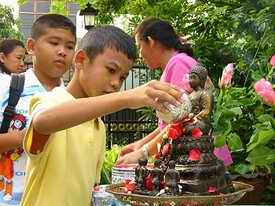 Annually in mid-April, the sun and the earth align such that at high noon the sun is directly over Thailand. This also happens to coincide
with the official beginning of the rainy season and the rice planting season. Hence, too, the closing of schools to allow all the children to lend a hand planting the rice. Except today, the children only seem to plant themselves in front of the TV or
computer game console.
Annually in mid-April, the sun and the earth align such that at high noon the sun is directly over Thailand. This also happens to coincide
with the official beginning of the rainy season and the rice planting season. Hence, too, the closing of schools to allow all the children to lend a hand planting the rice. Except today, the children only seem to plant themselves in front of the TV or
computer game console.
Culturally, there are a number of traditions associated with Songkran. One of them is a thorough cleaning of the house. Another is paying respect to the elders. Somewhere, between the two of these, the ‘throwing of water’
became part of the culture. If you are fortunate enough to accompany your Thai significant other to her ‘home’, you will likely see these events in their original and meaningful manner.
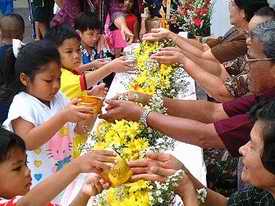 The entire village will gather at the customary place: the square, the village meeting room or temple. The elders of the village will be aligned in
descending order of age and the entire village will pass in front of them showing their respect by gently pouring lustral water on their hands. The elders thank them by calling blessings down on those so offering this honor. Immediately following this
ceremony, the villagers pour (not throw) water on each other and their Buddha – here too as a gesture of respect. Of course, this is just another excuse to eat so the ladies have arrayed all sorts of goodies for all to enjoy. The men then retire to get
drunk, while the ladies clean up.
The entire village will gather at the customary place: the square, the village meeting room or temple. The elders of the village will be aligned in
descending order of age and the entire village will pass in front of them showing their respect by gently pouring lustral water on their hands. The elders thank them by calling blessings down on those so offering this honor. Immediately following this
ceremony, the villagers pour (not throw) water on each other and their Buddha – here too as a gesture of respect. Of course, this is just another excuse to eat so the ladies have arrayed all sorts of goodies for all to enjoy. The men then retire to get
drunk, while the ladies clean up.
In the most traditional of places, a similar ceremony is held for the monks. At the very least, the monks are given their morning alms by just about everyone on the village on Songkran.
Thus Songkan is a very
respectful, civil day of respect and fun.
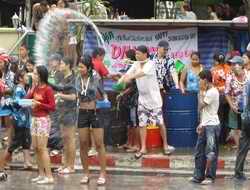 Not so in the modern Thai urban centers; here it is has become more like civil war. In a complete
reversal of Thai tradition and culture, it has lost all respect for anyone. The gentle Thai-ness of the pouring of lustral waters has given way to PVC cannons that can knock over a small child. Drunkenness will abound. Some of the ladies treat it more
like a wet-t-shirt contest than a day of respect. Guys will use it as an opportunity to gape and grope the ladies. Hoses and water cannons are used to inundate innocent by-standers. Water is blasted through the open windows of busses on the street. All
respect for people going to work, for their clothes or their possessions is forgotten.
Not so in the modern Thai urban centers; here it is has become more like civil war. In a complete
reversal of Thai tradition and culture, it has lost all respect for anyone. The gentle Thai-ness of the pouring of lustral waters has given way to PVC cannons that can knock over a small child. Drunkenness will abound. Some of the ladies treat it more
like a wet-t-shirt contest than a day of respect. Guys will use it as an opportunity to gape and grope the ladies. Hoses and water cannons are used to inundate innocent by-standers. Water is blasted through the open windows of busses on the street. All
respect for people going to work, for their clothes or their possessions is forgotten.
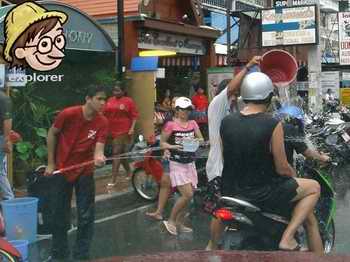 Motorcyclists are the most
vulnerable. With or without a helmet, having a few liters of water hit you in the face causes a natural reflex to close one’s eyes and swerve. Add the slippery wet streets to the mix and accidents abound. Luckily, most of these are but a minor
inconvenience. Yet, the death toll will soar during this same period mostly due to drunken antics.
Motorcyclists are the most
vulnerable. With or without a helmet, having a few liters of water hit you in the face causes a natural reflex to close one’s eyes and swerve. Add the slippery wet streets to the mix and accidents abound. Luckily, most of these are but a minor
inconvenience. Yet, the death toll will soar during this same period mostly due to drunken antics.
Once again (see Loy Kratong), modern Thais have found a way to take something gentle and beautiful and turn it into an excuse to maim and kill.
Suggestions for newcomers: Many farangs adopt a typhoon mentality for the week of Songkran. They lay in a supply of food and water (and abundant alcoholic beverages) and hunker down in front of the TV. Should you brave the storm and venture forth, it
is highly advisable to place all items like your wallet, passport or any electronics in plastic bags. YOU WILL GET WET!
Although, Thailand is a country the approximate size of a postage stamp, some areas like Pattaya have decided that they can
split an astrologic hair and determine that here the sun isn’t directly over head until a week after it happens in Bangkok – barely 150 kms away. So the majority of the civil warfare here will not occur until 19-20 APR. To make matters even worse, the
entire city will be enveloped in grid lock as water-laden pick-up trucks full of fun-seeking teens will clog the streets. Do NOT plan to drive anywhere. You simply can’t move. Luckily, such mayhem subsides with the setting of the sun, so a visit to your
favorite source of alcohol and groping is still in play.
Update: A Return to Civility
April 2
2007 by jj
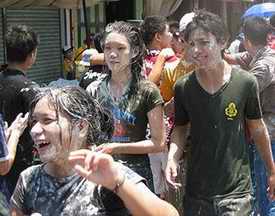 Like many other ole farts, I chose to hunker down for 'water week', but I did venture as far as my favorite
neighborhood bar to watch the festivities on the main soi near my home. I was amazed how civility abounded!
Like many other ole farts, I chose to hunker down for 'water week', but I did venture as far as my favorite
neighborhood bar to watch the festivities on the main soi near my home. I was amazed how civility abounded!
Revelers from 6-60 were lined up enjoying the day. And being quite civil about the process. Water was being arced over the road in the
path of vehicles rather than aimed at their faces. Bowls, not buckets and water cannons, were the most common means of dispersing water. I nary saw a PVC cannon all day! Powder was respectfully layered on the old and young alike.
Motorcycles were
being flagged down and the occupants dowsed and dusted not drenched. Pick-ups were exchange broadsides as they passed but the disinterested and street vendors were being spared.
A few hours later, those same pick-ups came lumbering back, riding a
bit higher with ammunition and energy expended. Unlike Soi 7, nary a boob was flashed -- Oh darn!
All in all, it was more akin to the time-honored Thai day than the recent civil wars.
The revelers, young and old, will sleep well tonight.
The Astrology of Songkran
From the Bangkok Post , April 2008
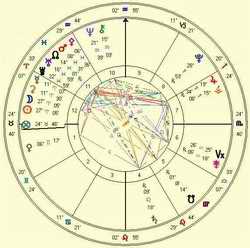 If the Culture Ministry has its way, the next Songkran festival will not necessarily start on April 13.
If the Culture Ministry has its way, the next Songkran festival will not necessarily start on April 13.
Wattana Boonchab, an expert at the
Culture Ministry, said the ministry is considering reviving a tradition in which Songkran Day is determined with the help of an ancient calendar that is common in most Southeast Asian countries, rather than fixing the date on April 13.
By
tradition, Songkran Day is determined based on a suriya yatra sacred book which describes the passing of the sun.
Songkran is a Sanskrit word, meaning the passing of the sun from one zodiac to another. The passing happens every month, but the
most important passage is in April when the sun leaves Pisces to enter Aries, which traditionally marks the beginning of the new year.
That Songkran is fixed on April 13 makes people forget the other two important days during the traditional new
year. They are wan nao and wan thaloeng sok, which literally means celebration of the new year, on April 15 or April 16, Wattana said.
Nao, he said, means stay in Thai. In this sense, it specifically means the lapse of the sun passing: That's
exactly the period when the sun is between the two zodiacs. Nao when pronounced by people in the North is a word that gives this particular date an inauspicious meaning. It sounds like the word for rotten so people usually skip this day if they are to
hold an important event, to avoid bad luck.
But since we no longer recognise wan nao, we inadvertently conduct auspicious ceremonies on an inauspicious day. The revival of the tradition will help people know when to avoid this
date,that is, a day between Songkran and wan thaloeng sok.
Wattana said wan thaloeng sok this year falls on April 15 and it will fall on April 16 for the next three years. In 2012, it falls again on April 15. Thereafter, thaloeng sok will be on
April 16 for the next 80 years
Warning: Out of Hand
April 2008, from Pattaya
Secrets
 [My wife has a salon near the beer bars of sois 7 and 8].
[My wife has a salon near the beer bars of sois 7 and 8].
Yesterday most people were playing Songkran in that area so she
decided that she and her staff would join in. She came home about 8 p.m. and reported that she never wanted to play Songkran again.
She said that there were roving gangs of up to 10 drunken farangs – mainly Brits – who were abusive and very
rough. The carried illegal power water guns, and buckets of ice. When they reached her shop they would physically grab her and her staff so that they couldn’t escape and blast them with water and ice.
If they tried to resist, they were subjected
to profanities and abuse. She said that normally on that side of the street there would only be a trickle of farangs wandering along, but yesterday the road was full of farangs looking to make mayhem.
A 4 year old boy wasn’t spared. The more he
cried the more they taunted him and soaked him. They had to put him inside the shop for his own safety.
My wife’s arms are covered in bruises where these louts had grabbed her.
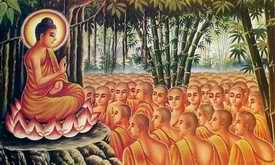 Makha Bucha day commemorates two separate events that occurred on the same date 45 years
apart, during the Buddha's lifetime 2,500 years ago. The first event was the coming together of 1,250 monks from all locations and directions, to meet and be ordained by the Buddha. This event occurred seven months after the Buddha began his teachings.
Makha Bucha day commemorates two separate events that occurred on the same date 45 years
apart, during the Buddha's lifetime 2,500 years ago. The first event was the coming together of 1,250 monks from all locations and directions, to meet and be ordained by the Buddha. This event occurred seven months after the Buddha began his teachings.
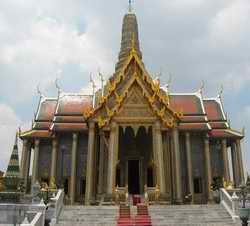 April 6 is Chakri Memorial Day, a national holiday. It marks the date of the founding of
the Chakri Dynasty on April 6, 1782 after the death of King Taksin.
April 6 is Chakri Memorial Day, a national holiday. It marks the date of the founding of
the Chakri Dynasty on April 6, 1782 after the death of King Taksin.  Annually in mid-April, the sun and the earth align such that at high noon the sun is directly over Thailand. This also happens to coincide
with the official beginning of the rainy season and the rice planting season. Hence, too, the closing of schools to allow all the children to lend a hand planting the rice. Except today, the children only seem to plant themselves in front of the TV or
computer game console.
Annually in mid-April, the sun and the earth align such that at high noon the sun is directly over Thailand. This also happens to coincide
with the official beginning of the rainy season and the rice planting season. Hence, too, the closing of schools to allow all the children to lend a hand planting the rice. Except today, the children only seem to plant themselves in front of the TV or
computer game console.  The entire village will gather at the customary place: the square, the village meeting room or temple. The elders of the village will be aligned in
descending order of age and the entire village will pass in front of them showing their respect by gently pouring lustral water on their hands. The elders thank them by calling blessings down on those so offering this honor. Immediately following this
ceremony, the villagers pour (not throw) water on each other and their Buddha – here too as a gesture of respect. Of course, this is just another excuse to eat so the ladies have arrayed all sorts of goodies for all to enjoy. The men then retire to get
drunk, while the ladies clean up.
The entire village will gather at the customary place: the square, the village meeting room or temple. The elders of the village will be aligned in
descending order of age and the entire village will pass in front of them showing their respect by gently pouring lustral water on their hands. The elders thank them by calling blessings down on those so offering this honor. Immediately following this
ceremony, the villagers pour (not throw) water on each other and their Buddha – here too as a gesture of respect. Of course, this is just another excuse to eat so the ladies have arrayed all sorts of goodies for all to enjoy. The men then retire to get
drunk, while the ladies clean up.  Not so in the modern Thai urban centers; here it is has become more like civil war. In a complete
reversal of Thai tradition and culture, it has lost all respect for anyone. The gentle Thai-ness of the pouring of lustral waters has given way to PVC cannons that can knock over a small child. Drunkenness will abound. Some of the ladies treat it more
like a wet-t-shirt contest than a day of respect. Guys will use it as an opportunity to gape and grope the ladies. Hoses and water cannons are used to inundate innocent by-standers. Water is blasted through the open windows of busses on the street. All
respect for people going to work, for their clothes or their possessions is forgotten.
Not so in the modern Thai urban centers; here it is has become more like civil war. In a complete
reversal of Thai tradition and culture, it has lost all respect for anyone. The gentle Thai-ness of the pouring of lustral waters has given way to PVC cannons that can knock over a small child. Drunkenness will abound. Some of the ladies treat it more
like a wet-t-shirt contest than a day of respect. Guys will use it as an opportunity to gape and grope the ladies. Hoses and water cannons are used to inundate innocent by-standers. Water is blasted through the open windows of busses on the street. All
respect for people going to work, for their clothes or their possessions is forgotten.  Motorcyclists are the most
vulnerable. With or without a helmet, having a few liters of water hit you in the face causes a natural reflex to close one’s eyes and swerve. Add the slippery wet streets to the mix and accidents abound. Luckily, most of these are but a minor
inconvenience. Yet, the death toll will soar during this same period mostly due to drunken antics.
Motorcyclists are the most
vulnerable. With or without a helmet, having a few liters of water hit you in the face causes a natural reflex to close one’s eyes and swerve. Add the slippery wet streets to the mix and accidents abound. Luckily, most of these are but a minor
inconvenience. Yet, the death toll will soar during this same period mostly due to drunken antics.  Like many other ole farts, I chose to hunker down for 'water week', but I did venture as far as my favorite
neighborhood bar to watch the festivities on the main soi near my home. I was amazed how civility abounded!
Like many other ole farts, I chose to hunker down for 'water week', but I did venture as far as my favorite
neighborhood bar to watch the festivities on the main soi near my home. I was amazed how civility abounded!  If the Culture Ministry has its way, the next Songkran festival will not necessarily start on April 13.
If the Culture Ministry has its way, the next Songkran festival will not necessarily start on April 13. 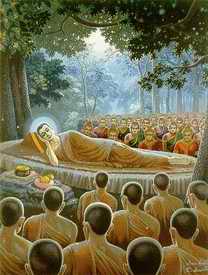 Visakha Bucha is an annual holiday observed by practicing Buddhists. The exact date of Vesak varies
according to the lunar calendar. It falls on a full moon
Visakha Bucha is an annual holiday observed by practicing Buddhists. The exact date of Vesak varies
according to the lunar calendar. It falls on a full moon 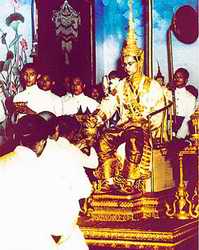 King Bhumibol Adulyadej ascended to the throne on June 9 but finished his studies in Europe before returning
to Thailand for his coronation on 5th May 1950. He was crowned King during an elaborate and highly intricate ceremony that outshone all previous coronations in Thailand.
King Bhumibol Adulyadej ascended to the throne on June 9 but finished his studies in Europe before returning
to Thailand for his coronation on 5th May 1950. He was crowned King during an elaborate and highly intricate ceremony that outshone all previous coronations in Thailand. 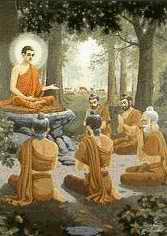 The Buddhist Holy Day of Asarnha Bucha falls on the 15th night of the full moon during the eighth month of the Buddhist Lunar calendar.
The Buddhist Holy Day of Asarnha Bucha falls on the 15th night of the full moon during the eighth month of the Buddhist Lunar calendar.
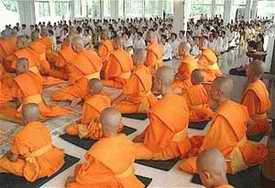 The day following Asarnha Bucha Day is called Khao Pansa or Buddhist Lent Day. This day falls on
the first full moon of the Buddhist Lunar calendar during the eighth month of every year.
The day following Asarnha Bucha Day is called Khao Pansa or Buddhist Lent Day. This day falls on
the first full moon of the Buddhist Lunar calendar during the eighth month of every year. 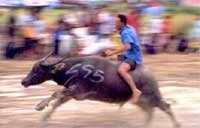 Around the time of the full moon in the 11th lunar month, usually the
first weekend in October, farmers from all over the province bring their buffalo to Chonburi City for a festival that dates back centuries. Costumed dancers move to the music of traditional Thai songs amid flags and banners. General merriment prevails as
local beauties vie for the title of "Miss Farm Maiden". Judges also award prizes to the best decorated buffalo.
Around the time of the full moon in the 11th lunar month, usually the
first weekend in October, farmers from all over the province bring their buffalo to Chonburi City for a festival that dates back centuries. Costumed dancers move to the music of traditional Thai songs amid flags and banners. General merriment prevails as
local beauties vie for the title of "Miss Farm Maiden". Judges also award prizes to the best decorated buffalo. 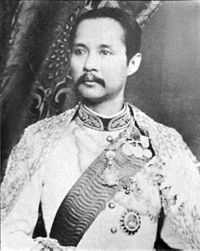 Chulalongkorn (Rama V) was the fifth king of the Chakri dynasty of Thailand. He is regarded
as one of the greatest kings of Siam, as he is also called by Thais as "The Great Beloved King".
Chulalongkorn (Rama V) was the fifth king of the Chakri dynasty of Thailand. He is regarded
as one of the greatest kings of Siam, as he is also called by Thais as "The Great Beloved King". 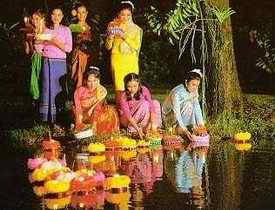 As the full moon of the twelfth lunar month (usually in mid-November) lights up the night sky, throughout the Thai kingdom, hundreds of thousands
of ornately-decorated krathong or traditional banana leaf floats are set adrift in rivers and waterways in a spell-binding ritual called Loi Krathong - the 'festival of lights". This is one of the Kingdom's oldest and best-preserved traditions.
As the full moon of the twelfth lunar month (usually in mid-November) lights up the night sky, throughout the Thai kingdom, hundreds of thousands
of ornately-decorated krathong or traditional banana leaf floats are set adrift in rivers and waterways in a spell-binding ritual called Loi Krathong - the 'festival of lights". This is one of the Kingdom's oldest and best-preserved traditions. 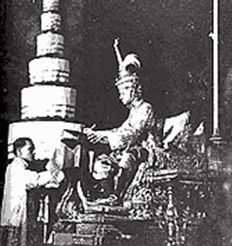 On 24 June 1932, the People's Party, a coalition of civil servants, princes, and
army officers, seized power from the King in a bloodless coup. A provisional constitution was sent to King Prajadhipok along with an ultimatum from Party leaders. On 26 June, the King met the Party leaders and refused to sign the charter. The next day,
the King met the leaders again and signed the charter.
On 24 June 1932, the People's Party, a coalition of civil servants, princes, and
army officers, seized power from the King in a bloodless coup. A provisional constitution was sent to King Prajadhipok along with an ultimatum from Party leaders. On 26 June, the King met the Party leaders and refused to sign the charter. The next day,
the King met the leaders again and signed the charter. 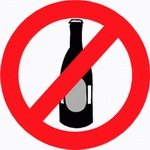 August 2007
August 2007 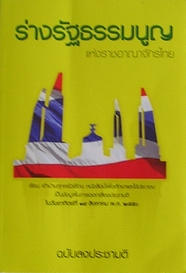 The up-coming referendum on the Thai Constitution is a perfect example. Many sources have assumed that as with previous elections, it will
be a dry day but that may or may not be true. It all depends…on what the nanny state can’t seem to decide.
The up-coming referendum on the Thai Constitution is a perfect example. Many sources have assumed that as with previous elections, it will
be a dry day but that may or may not be true. It all depends…on what the nanny state can’t seem to decide. 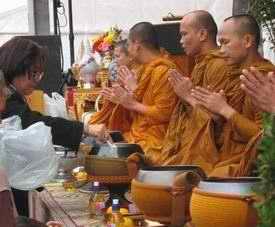 This leads naturally to another key point. Within Thailand there are two primary consumer groups for alcohol: Thais and all others. The bars in which
these two groups engage in alcohol consumption tend to be completely different. What good does it do the nanny state to declare that all foreigners must be deprived of access to alcohol and sex by declaring that all bars they frequent must close during
the elections? By definition, foreigners are not participants in Thai elections. If the nanny state feels it imperative to control access to alcohol among its voters, a simple ban on the sale of alcohol to Thais could be imposed, not involving non-Thais
in any way. Such a clear declaration would simplify life for bar owners and staff. If your clientele is primarily Thai, you might find it convenient to close on dry days. If your clientele is exclusively farang, no need to close. The sole exception would
be religious-based holidays. It would seem reasonable to close all bars and ban the sale of sex and alcohol on such days, but even this could be subject to another debate.
This leads naturally to another key point. Within Thailand there are two primary consumer groups for alcohol: Thais and all others. The bars in which
these two groups engage in alcohol consumption tend to be completely different. What good does it do the nanny state to declare that all foreigners must be deprived of access to alcohol and sex by declaring that all bars they frequent must close during
the elections? By definition, foreigners are not participants in Thai elections. If the nanny state feels it imperative to control access to alcohol among its voters, a simple ban on the sale of alcohol to Thais could be imposed, not involving non-Thais
in any way. Such a clear declaration would simplify life for bar owners and staff. If your clientele is primarily Thai, you might find it convenient to close on dry days. If your clientele is exclusively farang, no need to close. The sole exception would
be religious-based holidays. It would seem reasonable to close all bars and ban the sale of sex and alcohol on such days, but even this could be subject to another debate. 